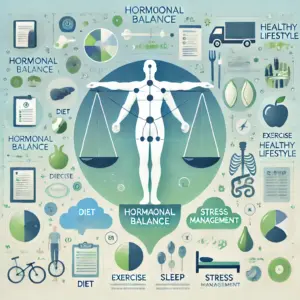Key Takeaways
- Hormonal balance is essential for physical and mental well-being.
- Imbalances can lead to a variety of health issues, including mood disorders and chronic fatigue.
- Lifestyle choices such as diet, exercise, and stress management are vital in maintaining hormonal balance.
- Understanding the signs of hormonal imbalance is critical for early intervention and treatment.
Table of Contents
- Introduction to Hormonal Balance
- Why Hormonal Balance Matters
- Common Causes of Hormonal Imbalance
- Identifying Hormonal Imbalances
- Lifestyle Choices for Maintaining Balance
- The Role of Diet in Hormonal Health
- Managing Stress for Hormonal Harmony

Introduction to Hormonal Balance
Hormones are the body’s chemical messengers, integral in orchestrating many essential processes such as metabolism, growth, and emotional regulation. Think of hormones as the silent directors behind the scenes, ensuring the show goes smoothly. They govern our sleep cycles, affect how we handle stress and even influence how we digest food. When the symphony they conduct is in tune, our bodies and minds function seamlessly.
Disrupting this harmony can lead to a cascade of problems affecting both physical and mental health. Such disruptions can manifest in more ways than one might anticipate, influencing aspects of life ranging from energy levels to emotional stability. With many organizations, such as Formula Wellness, providing insights on adjusting one’s lifestyle to maintain this balance, individuals can find guidance in managing their health more effectively.
Why Hormonal Balance Matters
A balanced hormonal system ensures that bodily functions operate like a well-coordinated orchestra. Even a small imbalance might set off a chain reaction, which could result in issues such as persistent insomnia, unwanted weight changes, and mood swings that can feel impossible to control. Research published by experts in the Nature Journal underscores how critical hormones are in maintaining systemic equilibrium and how pivotal this balance is in preventing such disturbances from escalating into more serious health concerns.
A well-tuned hormonal balance is not just about avoiding discomfort. It’s fundamental for preventing several chronic diseases and maintaining a vibrant and active lifestyle as we age. By understanding hormones’ vital role, you can empower yourself with the tools and knowledge necessary to work towards optimal health.
Common Causes of Hormonal Imbalance
Various factors can disrupt hormonal harmony, often silently and unnoticed in the hustle and bustle of everyday life. Dietary habits, such as the overconsumption of sugar and processed foods, are the primary culprits. Environmental influences, including exposure to endocrine-disrupting chemicals in everyday products such as plastics, detergents, and cosmetics, also contribute significantly. Additionally, stress, lack of adequate sleep, and a sedentary lifestyle exacerbate these imbalances, sometimes leading to more complex health issues.
Age also plays a role, with hormonal changes prominent during critical life phases. Women, for example, typically experience imbalances during menopause, while men might encounter shifts during andropause. Understanding these causes is the first step towards developing strategies to mitigate their impact and promote hormonal health.
Identifying Hormonal Imbalances
Attention to your body’s signals is essential in identifying hormonal disturbances early. Symptoms such as sudden or unexplained weight changes, chronic fatigue, persistent anxiety or depression, and sleep disturbances can often be indicators of hormonal imbalance. While these symptoms may seem commonplace, their continuous presence can signify a more profound issue.
When these symptoms arise, it is crucial to maintain open communication with healthcare professionals and stay informed. They can provide accurate assessments and, if necessary, offer treatments or strategies to help restore balance, facilitating a healthier, more balanced life.
Lifestyle Choices for Maintaining Balance
Adopting a proactive approach to health through thoughtful lifestyle choices can significantly impact hormonal balance. Regular physical activity, whether it’s a brisk walk, a gym session, or a yoga class, not only aids in maintaining optimal weight but also boosts mood-enhancing hormones such as endorphins.
Furthermore, quality sleep is indispensable. Restful and adequate sleep helps the body rejuvenate and stabilize hormone production, setting the pace for balanced daily functioning. Individuals can foster an environment that supports hormonal harmony by cultivating these habits.
The Role of Diet in Hormonal Health
The connection between diet and hormonal health is profound. Consuming whole foods rich in essential nutrients supports both hormone production and metabolism. Foods high in essential fatty acids, like salmon, walnuts, and flaxseeds, play a significant role in maintaining hormonal stability.
According to insights from Harvard Health, maintaining a balanced diet that limits sugars and processed foods can greatly influence hormonal activity, promoting a stable and healthy internal environment. This dietary awareness empowers individuals to make informed choices that support long-term health.
Managing Stress for Hormonal Harmony
Chronic stress is a notorious disruptor of hormonal balance, leading to the overproduction of cortisol, a hormone that can interfere with the function of other vital hormones. This interference disrupts the body’s equilibrium, affecting health in several ways.
Incorporating stress-relief techniques into daily routines can significantly mitigate stress levels. Practices such as meditation, deep-breathing exercises, and regular breaks from digital screens can promote a calmer mind and a more balanced set of hormones. These practices help create a resilient body capable of adapting to daily life stressors.
